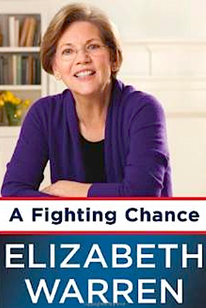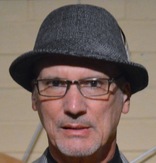A WRITER'S WIT
When I sit down to write, I don't think about writing about an idea or a given message. I just try to write a story which is hard enough.
Jhumpa Lahiri
Born July 11, 1967
My Book World
Ahead of her Time or Too Late?

This book is full of acronyms: AFSCME=American Federation of State, County and Municipal Employees, AFR=Americans for Financial Reform, ARM=adjustable rate mortgage, CDO=collateralized debt obligations, CFPB=Consumer Financial Protection Bureau, CRL=Center for Responsible Lending, COP=Congressional Oversight Panel, TBTF=Too Big to Fail, TARP=Troubled Asset Relief Program, and many others. I learned that I’d better memorize them or keep a key beside me because to understand them is to understand a lot of Elizabeth Warren’s story.
This memoir by Warren is largely about her stance on how finance is handled in America. At the same time, her autobiography is threaded throughout the book, from her truly humble beginnings in Oklahoma to her much-heralded run for US Senate in Massachusetts in 2012—at which point her opponent, Scott Brown, accuses her of misrepresenting her Native American roots. Through her struggle the reader sees his or her own. She may be the least political politician currently in office. Many of her ideas appeal to Progressives, as well as Tea Party members. Repeatedly she says, “The system is rigged.” It is rigged in favor of corporate interests, which have eroded and continue to erode middle-class life in America.
One way to fight back: “When you have no real power, go public—really public. The public is where the real power is” (126). And this is the kind of action she takes all throughout her career. When before a crowd or audience, she speaks plainly and easily about complex problems, sounding much like the law school professor she has been for many years. Now instead of educating law students, she’s educating the public.
Warren, of course, is reviled by the financial community (Wall Street), but that is because she’s on the side of the middle and working class families, whose incomes have been diluted over the last thirty years. Her run for the Senate begins when someone makes a video of her speaking in someone’s home. I’m paraphrasing her words: No one in this country makes it alone. People who succeed in business must work hard—that’s a given—but they must use roads and other forms of infrastructure that our taxes pay for; and the more heavy-duty their business is the harder they are on this infrastructure, yet they feel entitled to pay less in taxes than their secretaries. I would add that local, state, and federal laws combine to give corporations all kinds of breaks, the large oil companies receiving government subsidies being one of many examples.
Warren lays all this all out in prose that is simple yet artful. She threads her words with figurative language that demonstrates further what she is saying to her audience. I believe Warren when she ways she’s not running for president. I believe her goal is to spend the rest of her life leveling the playing field, so that the middle and working classes might again have the opportunities they once had. So that young people might attend college for reasonable prices and finance it through loans at rates that are no higher than what banks have to pay for money. Yet, everywhere she goes, she creates energy, energy that is contagious. Might she just be drafted to run for president? Might she give another woman a run for her money?
Out of the Past, They Determine the Future
| Schulman, Daniel. Sons of Wichita: How the Koch Brothers Became America’s Most Powerful and Private Dynasty. New York: Grand Central, 2014. Whenever I meet others who are also from Wichita, I’m often asked where I went to high school. It is a subtle way of determining very quickly to which social class I must belong. Indeed, I grew up on the other side of several sets of tracks, certainly far from the East Thirteenth Street address, where the Koch brothers spent their early years. In fact, beyond a certain point the Koch brothers didn’t even attend Wichita public schools, but exclusive preparatory or military schools in other parts of the country. And only one of the brothers, Charles, continues to live in Wichita today. The rest of them live (given they own multiple residences) in a variety of places, including the Northeast. |
The four brothers’ father, Fred Koch, for example, originally hailed from Quanah, Texas, making Wichita more or less a place of happenstance for the brothers. Fred is a cold and tyrannical father, yet all but one of the sons sets out to try and please their father, that is, emulate him and his maniacal competitiveness in every way. Only one, Frederick, Junior, chooses to follow his own path. Rather than taking his millions and establishing his own dynasty, he prefers the life of the arts: living in a lush place in Manhattan (and in Europe) and attending musical and visual arts productions, purchasing expensive art as if it’s going out of existence. Throughout their lives, the brothers will sue one another for various reasons, until some time in the 1990s, they decide to call a truce—although there still exist deep suspicions among some of the brothers for each other to this very day. Charles and David, though eight years apart, seem to share the most concerning political beliefs and set out to change the country through their activism. They’re just as fervent as their father was, when he served as one of the founding members of the John Birch Society. When all the facts are laid out, one can see how the Koch brothers have become the men they have. It still doesn’t make some like their political stands, but at least one does understand how perhaps they became the men they did, wanting and fighting for completely unfettered freedom to earn as much money as they want without governmental interference. That, they believe, is the salvation for everyone. If you have the utter freedom to earn as much money as you want, you will be happy, and everything will turn out well in the end. Funny what drives some people, when it would be so easy for them to wrap themselves in their billions, like a cocoon, and waste away inside. This they do not do.
NEXT TIME: More of MY BOOK WORLD



 RSS Feed
RSS Feed